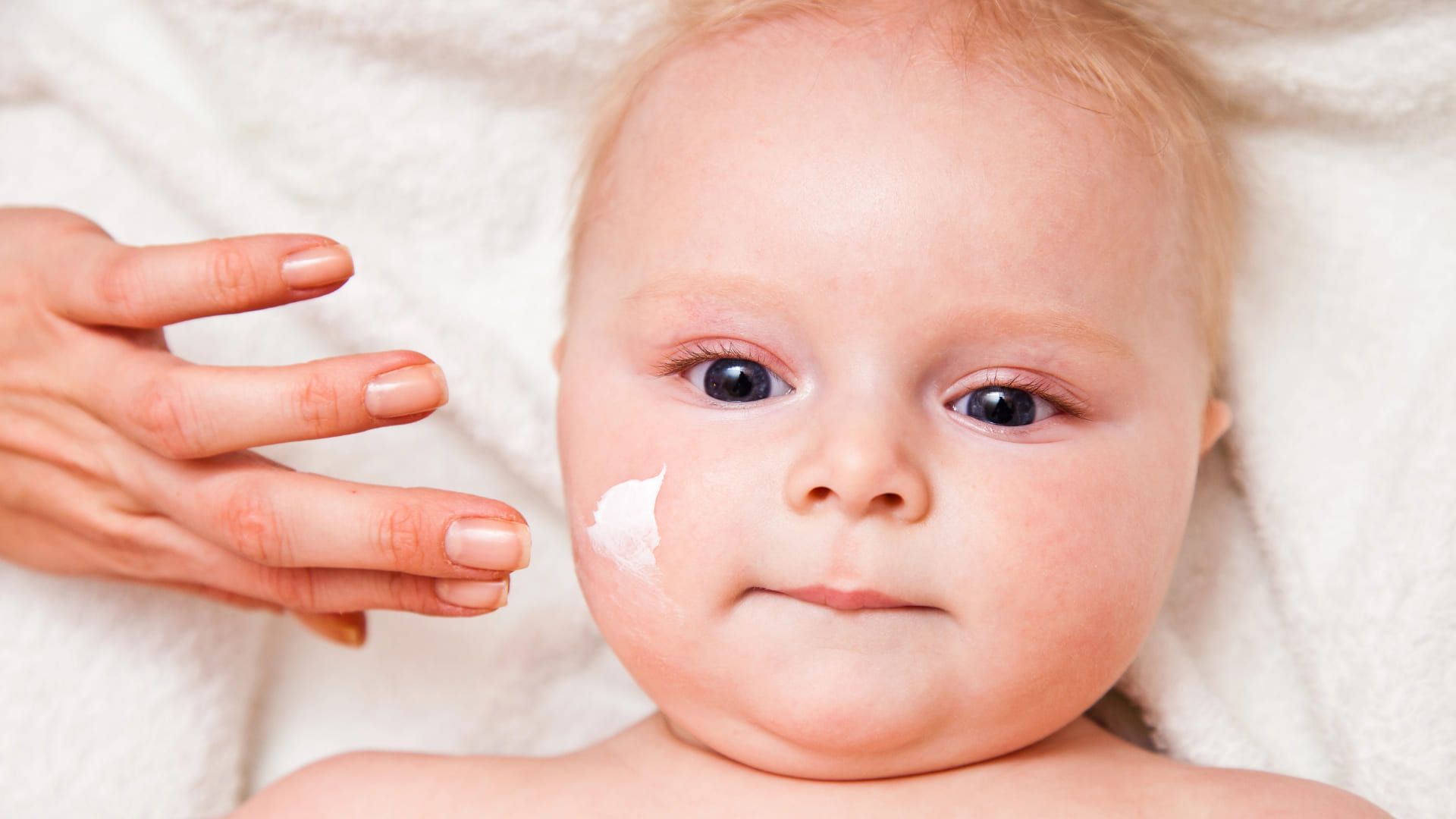Best cream for newborn

Sarah Johnson, MD

Although newborns' skin is renowned to be exceptionally silky, maintaining that softness and health occasionally calls for the use of one of the greatest baby lotions available. As infant skin is thinner and more prone to water loss, choosing the ideal body lotion for your child is actually more crucial than choosing the greatest one for yourself. Moisturizers can help the skin stay hydrated and protected."
After the first few weeks of life, baby lotion can play a significant role in preserving your child's moisture barrier, which is essential for assisting the body in keeping impurities and bacteria out and water and essential electrolytes in. Moreover, an infant-specific moisturizer can help relieve irritated, dry skin. If your baby's skin is red, irritated, inflamed, or cracked, or if it is causing discomfort—such as rubbing, scratching, or trouble falling asleep—you should probably give them moisturizer.
- How to Use Baby Lotions Safely
- When is it safe to begin using lotion on your baby?
- What are the most important things to look for in a baby lotion?
- What's the difference between unscented and fragrance-free baby lotion?
- Factors to Consider When Picking Baby Lotion
- How Often Should I Apply Lotion to My Baby’s Skin?
- Can I Put Baby Lotion on My Newborn?
- Can I Use Regular Sensitive Skin Lotion for My Baby?
How to Use Baby Lotions Safely
Babies' bodies are directly impacted by everything they put on their skin, so you should be especially careful about the items you use on them. While not all of these are generally seen as dangerous, some dermatologists advise avoiding the substances parabens, phthalates, talc, alcohol, artificial colors, artificial smells, and dyes. The American Academy of Pediatrics issues warnings about formaldehyde, which irritates the respiratory system, phthalates, which interfere with hormones, talc, which is frequently found mixed with asbestos that causes cancer, and heavy metals like lead. Additionally, the AAP recommends that caregivers treat infants and kids with eczema with hypoallergenic, fragrance-free items.
better with Soula

Support for every woman:
✅ A Personalized Plan to reduce anxiety and overthinking
✅ 24/7 Emotional Support whenever you need it Cycle-Aligned Mental Health Tracking — monitor your mood and symptoms in sync with your period
✅ Real-Time Insights into your energy levels and emotional state
✅ Bite-Sized Exercises to help you return to a calm, balanced state — anytime, anywhere
The FDA currently claims that parabens have not been demonstrated to be dangerous, despite the fact that certain research suggest that parabens are endocrine disruptors and that some of these classes of preservatives are banned in Europe. If you decide not to use parabens, be sure to follow the instructions on how long to use the product after opening it, as some goods lose their shelf life and become moldy if they don't include preservatives. According to a study that was published in the Journal of the American Academy of Dermatology, some preservatives that are employed in place of parabens are actually more allergenic than parabens.
Young children should take brief baths in cool, running water with mild soap and then apply light lotions. Working with your pediatrician is advised if flare-ups occur frequently and consistently. Other effective treatments include topical steroids and oral medicine, to mention a couple.
For everyday cleansing, try sticking with simple, mild formulas — this overview of the best soaps for newborns explains what keeps your baby’s skin clean without drying it out.When is it safe to begin using lotion on your baby?
You may notice that your newborn has what appears to be flaky skin in the first few weeks following delivery. During this period, there is modest universal skin flaking and the'vernix,' the waxy layer covering and protecting the infant in the womb, begins to peel off. It's not always a reason to grab the moisturizer; in fact, most pediatricians advise against using baby lotion on an infant until they are four weeks old. Since their skin is still developing after birth, newborns may be more susceptible to toxins and absorb them more readily. See your pediatrician if you believe your infant is experiencing dry skin instead of this normal shedding (for example, if you see redness or your child looks uncomfortable or itching).

What are the most important things to look for in a baby lotion?
When it comes to baby lotion (or anything else you apply to a baby's skin), less really is more. It's critical to select a moisturizer for your infant that is mild, hypoallergenic, and fragrance-free. She advises staying away from anything that contains irritants like synthetic perfumes, which can induce inflammation, due to that increased sensitivity and capacity to absorb chemicals. Rather, go for elements that are moisturizing and soothing, such as colloidal oatmeal, hyaluronic acid, ceramides, and shea butter.
The same care you give to your baby’s skin also matters for emotions. Babies easily sense their parents’ tension or calm, so staying grounded helps them feel safe and settled. Emotional sensitivity plays a big part in that quiet connection.What's the difference between unscented and fragrance-free baby lotion?
Baby items marked "fragrance-free" are not the same as unscented ones. Certain chemicals may be added to unscented skin care products in order to cover up or balance out their aroma. According to the Environmental Protection Agency, fragrance-free formulations are created without any additional scent-altering chemicals, whether they are intended to add or neutralize a particular smell.
Factors to Consider When Picking Baby Lotion
- Ingredients to Suit Babies’ Needs
Excellent anti-microbial properties can be found in calendula extract. Other ingredients that parents should look for in their baby's lotion include glycerine, ceramide, oatmeal, zinc oxide, and omega 6 fatty acids, such as gamma-linolenic acid.
Choose products made especially for the skin type of infants and children who are prone to eczema. Again, look for fragrance-free, hypoallergenic products containing ceramides, glycerine, paraffin, colloidal oatmeal, and other gentle, moisturizing ingredients. It's also important to stay away from fabric softeners, detergents, and abrasive soaps that can irritate their skin. In severe cases, consult a dermatologist; they can prescribe medications such as lotions or ointments to help treat the condition.
And when you’re navigating constant care routines, remember that your own emotional stability matters just as much. A bit of reflection or mindfulness can help you create a sense of emotional safety for both yourself and your baby.- Ease of Application
Generally speaking, you want the lotion to apply smoothly. However, varying demands necessitate varying thicknesses, and it goes without saying that a diaper cream will apply somewhat differently than a regular moisturizer. Because they all apply smoothly and don't leave behind white chalky residue, our choices are all highly rated.
How Often Should I Apply Lotion to My Baby’s Skin?
Maintaining this frequency can help to reduce the likelihood of irritation, itching, and dryness. The best moment to lock in moisture with a nice rub down is right after a bath, when your baby's skin is still slightly damp. However, if you're pressed for time and have to be more deliberate about when you lotion your newborn, this is the time to do it.
Can I Put Baby Lotion on My Newborn?
Your newborn's skin is sensitive and ever-changing as it adjusts to life outside the womb, yet it still needs to be moisturized because it might get dry. They can preserve their skin's natural hydration and prevent irritation by using mild, non-greasy lotions.
Can I Use Regular Sensitive Skin Lotion for My Baby?
You might be tempted to give your kid the lotion you have on hand because sensitive skin isn't just a baby thing. While baby lotion and lotion for sensitive skin share many characteristics and components, not all lotions for sensitive skin are made to be rich enough or mild enough for an infant's extremely delicate skin. You can continue using a baby lotion made specifically for your child's needs, or you can discuss using a regular lotion for sensitive skin with your pediatrician.
Parenthood can be overwhelming at times, and it’s okay to ask for support — even a quiet check-in with an AI Mental Health can help you process emotions and find balance during those early months.













